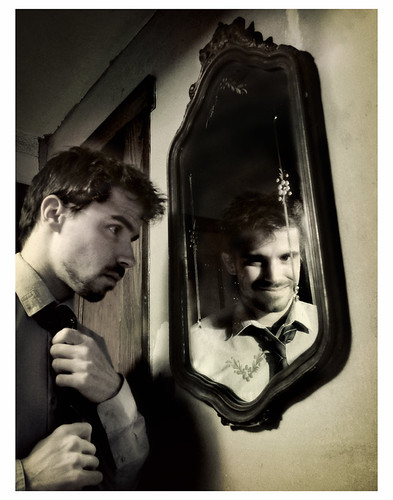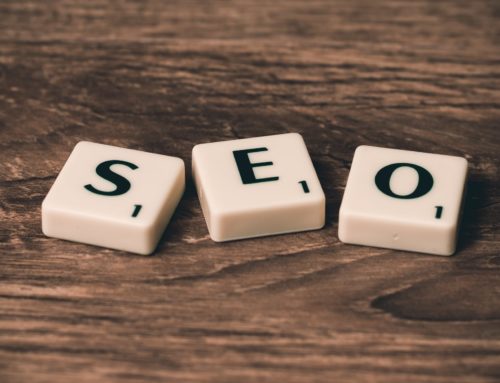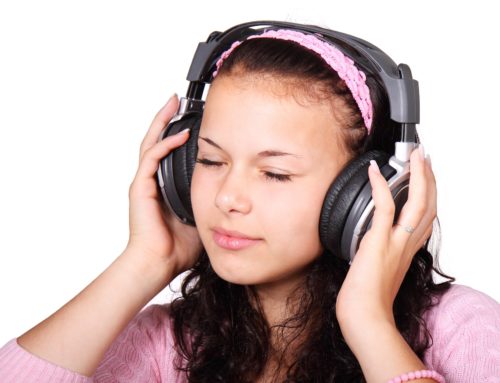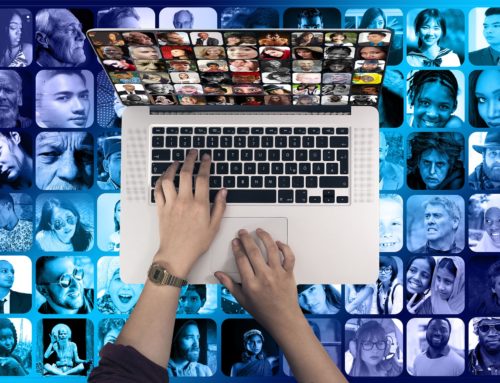 Guest post by Erica Holt
Guest post by Erica Holt
How easy is it, really, to be authentic online?
I’ve been thinking about this since Shonali’s thought-provoking post a few weeks back about how to social network smartly by being yourself online.
She points out, “If you’re you online, you’ll be you offline.”
I tend to agree with this assertion, but her post definitely got me wondering about online identity from a cyberpsychology perspective.
What are we really up against (against ourselves) in the way we behave on social networks?
Image: Erica Hart via Flickr, CC 2.0
While I’m surely no expert in this area, I do know we face certain obstacles.
The online disinhibition effect, for example, is a concept in psychology that explains why people may act differently online than off. Much of this depends on the individual.
Many feel more unrestrained in expressing themselves. This can be harmless personal sharing or random acts of kindness. This can also mean hurtful comments and angry outbursts.
This best summary I’ve found on online disinhibition is several years old, but still applies to today’s world of social media communication.
The author, psychologist John Suler, explains these contributions to online disinhibition behavior:
- Personality traits may be “heightened.” For example a normally polite woman with repressed anger may lash out.
- No one can see or hear you. Appearances don’t matter. Tone, inflections, head shakes, facial expressions — nothing. All we’ve got are emoticons.
- People may perceive interactions as happening in their own heads.
Yeah this sounds a bit out there, but Suler explains that without the visual and verbal, people may feel like they are talking to themselves. And you know what you say to yourself you might not share with others.
- Status is minimalzed. On Twitter, for example, you might be friends with people of various social and career statuses (which is part of the reason it’s awesome!). But online, you may also feel more comfortable communicating directly to a CEO of some big company what you may hold back in person.
- Asynchronous communications. Interactions may be but are not always in real time. Some respond immediately, others wait days or months.
Especially when miscommunication occurs, this can be dangerous.
- Anonymity. While most people in our field are transparent, the potential to act anonymously is always there.
I ask, then – is it truly possible to be yourself online when you are facing these very real psychological phenomena?
Clearly, some people are more adept at dealing with all of this than others, and so much is based on who you are, which really gets back to Shonali’s original point.
Quite honestly, I have good days and bad.
But perhaps, if you are conscious of the potential affects of online disinhibition while you are presenting yourself on social networks, it could be a bit easier to think about how you behave, communicate effectively, and show the real you.
(By the way, I’m hoping this is completely wrong and it’s actually really easy to be yourself online.)
I would love to hear what others think. So, what do you think?
 Erica Holt has more than eight years’ experience developing digital communication strategies for health, non-profit and public sector clients. She lives in Takoma Park, Md., with her husband and two young sons. You can catch up with her on Twitter or by email.
Erica Holt has more than eight years’ experience developing digital communication strategies for health, non-profit and public sector clients. She lives in Takoma Park, Md., with her husband and two young sons. You can catch up with her on Twitter or by email.








[…] And even when we are being pretty much ourselves online, most of us still have a filter we apply to our activity, despite the “online disinhibition effect” Erica Holt wrote about last year. […]
[…] The discussion in the comments got into dissecting what exactly it means to be “authentic” or “transparent” on the web, and why some people find it much easier to be their true selves online than others. (If you’d like to chime in, I highly recommend going over to Shonali’s and reading both Erica’s post and our discussion in the comments.) […]
@StacyLukasavitz Just now coming out of my cave. I’m going over to your place post-haste.
OK here: http://bit.ly/e4rvi0 … it rambles as much as it ruminates, but it’s up. And it has a picture of a gorilla, which is reason enough. :)
[…] what my voice is – and another trackback to Danny, heh – I know my limits. I’m authentic but I don’t get too personal, too […]
@Shonali I don’t tweet about clients, that site/Twitter feed is Clients From Hell, rants about bad design clients mostly, just funny stuff.
@3HatsComm Hey, if I can massage your ego, my work is done. :p
ROFL re: secret Twitter accounts! I too will sometimes – very sparingly, if you’ve noticed – RT client stuff, but only if/when it’s really useful. The worst thing I could do for a client would be to blanket RT/share their stuff, especially if they haven’t built up their own community. Because then I’d be nothing more than a shill.
@Shonali Well that went straight to my ego, thanks.
I see it all the time, lots of rants and “can you believe the nerve” conversations back and forth on Twitter. I do RT some clientsfh b/c I just can’t help myself as they are funny. ITA agree, it’s not about authenticity but common sense and professionalism. Tempts me to reply “Dear Ranter: Secret Twitter account. Look into it.” ;-)
@HowieSPM Re: Chat Roulette… never! Er, does such a thing really exist?
@HowieSPM Re: Chat Roulette… never! Er, does such a thing really exist?
@3HatsComm I think you said something VERY smart (well, pretty much everything you say is smart, but particularly…) in the “not ranting about clients” stuff. To me, that doesn’t denote lack of authenticity, it’s just commonsense.
@StacyLukasavitz “I know I still owe you one”… w00t!!! @ericaholt
In January I read a post by @tomcopy about this topic; it’s more of a rumination, too, as @StacyLukasavitz says (would love to read it, too!). It was the first time I’d seen someone say this aloud (yes, I mean, on screen) in a long time, and never on the topic of social media. As @3HatsComm
says, I think we all share something of ourselves, but not everything, just as we would in other settings. I told him later something like what you’ve said, @ericaholt : I figure if my online and offline halves don’t “match” in some way, either the in-person me or the SM me would be a disappointment to someone eventually. Can’t have that.
Great post! Thanks for putting this together.
@StacyLukasavitz Ruminations beat out explanations most of the times. Now, though, didn’t you just say below to “get over it.” I liked this advice. Now you are sending me back to “think a lot” zone ;) Erica shouldn’t go back there. Not for a while.
@ericaholt Well, it’s really not so much explaining anything as much as it is ruminating, but I will. I owe @Shonali one from like, December, where I said social media has actually made me LESS social. My reasons are many and I’ve been thinking about that one a lot lately…
@StacyLukasavitz You know what? Everything will be fine. It will! Thank you for saying that.
@StacyLukasavitz I would absolutely love to read this blog post, especially since it’s been hiding away for so long. Let him out, please…
One other point I wanted to touch upon that I totally agree with, @ericaholt , and that is your line “Especially when miscommunication occurs, this can be dangerous.”
I actually have a post already written in my drafts about this very subject, and have been reluctant to post it. I wrote it months ago, but I think I’ll put it in the hopper for next week. I’ll ping you when it’s up. (Also, @Shonali , I know I still owe you one from way-back-when… I haven’t forgotten!)
@ericaholt Thank you for writing, Erica. I wish I had more time to read this fascinating thread but so many chores and spring cleaning to do. :( I’m happy to be a part of the convo though and hope to stay in touch somehow. I love FB, Twitter and all the rest. Too time consuming but necessary, due dilligence. :)
@3HatsComm You make some very interesting points here and well said.
This is very interesting, I certainly believe that the ‘hiding behind the computer’ can be liberating and empowering, particularly in the days when anonymity reigned. Now via SM we’re supposed to be more ourselves, more authentic, more transparent. Yet we do select what we share and don’t – all for the sake of image, privacy, personality, career and so on.
@StacyLukasavitz word to your ‘personal brand’ riff, I think that’s a lot of what’s defined my approach to my professional reputation as @Shonali said, WYSIWYG. I’ve found this SM transparency schtick – for that’s what it is – to be liberating and I’ll let curse words slip in posts, tweets, a few comments; I let my style and humor shine through, and if it means someone wouldn’t want to work with me because I curse, admit to drinking wine, party on cruises with family and friends.. then I wouldn’t want to work with them anyway. I say it’s a schtick per my belief that if we were all 100% honest and transparent, we’d be reading a lot more “trolling for a job” and “looking for clients” and “I hate my boss, spouse, job” and “life sucks” tweets. IMHO.
Per @HowieSPM and @nskramer that said.. what I share is the real me, but not the whole me. I share things via tweets and blogs about marketing and PR b/c it interests me, b/c it’s my job, b/c I am networking to be better and hopefully more successful at that job. I’ll cheer for LSU, talk a little about a WDW vacation and make it human and likable, but don’t rant about clients, certain TV obsessions are kept to myself. Some things are better left to my personal SM accounts like FB, where they fit those audiences. And the inverse is true, I don’t bore high school FB buds with business-related shares.
Online or off, think it’s a lot like dating. We pick and choose what and where we share, and why. Then the closer you get, more involved.. out comes a little more truth and transparency. FWIW.
@StacyLukasavitz @Shonali @HowieSPM Grr.. my comment was just eaten. Anyway I agree with all of this. My dad knew that when I was in college, he knew what I wanted him to know, didn’t think I shared everything. Same thing with off and online. There’s a snarky image on one of my posts about being glad to know someone “only” online.
Shonali and I have been discussing that line between getting to know folks socially, via SM; then getting to know the clients from a business standpoint, if and how it does connect. You can’t assume you know everything about a person just from a comment or tweet. I’m pretty selective in what I share, and where.
Howie, I somehow managed to get through college with no psych, but sociology, yes. ;-) Like you my FB is personal, and this Twitter is my public, professional life with of course plenty of ‘real me’ too of course.
@ericaholt @nskramer Such a good point, and one reason for that is the online communities in which we participate are I think often more by choice, by interest. We can’t always talk about work to family and friends who can’t relate, you keep your political opinions to yourself in some circles, limit what is shared with your church group, certainly around the office. Yet in the cyberworlds we make for ourselves, maybe another side of our authentic self comes out. FWIW.
@StacyLukasavitz Yeah I can’t really argue with you here, Stacy.
@JoyceDadePHOTOS Thanks, Joyce! As others have pointed out, none of this is really new, but I think a whole crop of youngsters are experiencing this for the first time, not to mention the rest of us who are constantly connected and communicating in these media.
I’m right there with you, Shonali. There’s a lot I don’t mention online, but at the same time, it irks me to know that many people judge based ONLY on what somebody shares with the internet. IMHO, however, if somebody is going to make such a judgment based only on what they know of someone by their observed behavior online, it says more about that person than the person they’re judging. What people DON’T post is as much a part of their lives and their whole being as what they do.@Shonali @HowieSPM 3hatscomm
I’m not really sure where to chime into this discussion, as I agree with points made by various commenters and the post itself, but I’d have to say that in my experience, this is exactly the case. People that are “old hat” at this internet thing tend to just see the online world as a natural extension of one’s self, there being no difference between online and off. Like another commenter in this thread (hackmanj), I’ve been meeting people IRL since I was on IRC in the ’90s, and really, it’s no big deal. Even then, people I met for the first time after knowing them online told me that they’re exactly how they thought I’d be (or how I’d “portrayed” myself).
I’m finding, however, that even those who claim to be “social media pros” (both older and younger than me) are still in awe and wonderment at this whole meeting-offline-after-online phenomenon, and frankly, it’s OBVIOUS that there are a LOT of people who are just plain trying too hard with their whole “personal brand” schtick online that it’s really nothing like them at all in real life. I see too many professionals hypocritically preach authenticity online, yet at the same time are so busy polishing up their “personal brand” image that the slightest thing that makes them look HUMAN (a mistake, a swear word, saying you’re under the weather, admitting you’re wrong, etc.) is cause for nothing less than a psychological meltdown.
So there’s a computer screen between you and the rest of the world. Big deal. It’s not that hard, people. Just be yourself. Stop trying so hard, and everything will be fine. @timepass
What you’ve written sounds so right and so much the fun of Twitter especially although Facebook has virtues too. I’ve made some wonderful friends and it the market tool to beat all market tools including Facebook. Friends from all walks of life and all around the world, does it get better than that? I think it is really easy to be online although cyberspace people must get beyond a certain apprehension about being public and posting commentary etc. especially if they are not writers or used to being open and knowing that typos and irregular logic will be there in perpetuity. One must be brave. :) Thanks for this one, I loved reading this article.
@Shonali @ericaholt Shonali btw when are you adding the Chat Roulette word press plug in?
I think you are both right about gaining more experience in social networks and maturity in life in general lessening online disinhibition affects. Of course, we are using a definition of authenticity as offline and online personas matching up. One could also use this comfort and maturity to create online personas that don’t match up to offline at all :)
I think you are both right about gaining more experience in social networks and maturity in life in general lessening online disinhibition affects. Of course, we are using a definition of authenticity as offline and online personas matching up. One could also use this comfort and maturity to create online personas that don’t match up to offline at all :)
I think you are both right about gaining more experience in social networks and maturity in life in general lessening online disinhibition affects. Of course, we are using a definition of authenticity as offline and online personas matching up. One could also use this comfort and maturity to create online personas that don’t match up to offline at all :)
I think you are both right about gaining more experience in social networks and maturity in life in general lessening online disinhibition affects. Of course, we are using a definition of authenticity as offline and online personas matching up. One could also use this comfort and maturity to create online personas that don’t match up to offline at all :)
@HowieSPM I come across a lot of folk who want to keep different parts of their lives separate. 3hatscomm still has a great discussion going over at her place around this. For me, if I don’t want people knowing something, or some part of my life, I just don’t mention it – online or offline. So there are definitely some “walls” as you put it, but I don’t really apply them to my socnet activity. WYSIWYG, pretty much.
@HowieSPM I come across a lot of folk who want to keep different parts of their lives separate. 3hatscomm still has a great discussion going over at her place around this. For me, if I don’t want people knowing something, or some part of my life, I just don’t mention it – online or offline. So there are definitely some “walls” as you put it, but I don’t really apply them to my socnet activity. WYSIWYG, pretty much.
@hackmanj Yes, I do, Joe. They’re all quite fab!
@timepass “Is there a possibility that online disinhibition works less as an individual has more experience and understanding of social networks and the online space?” … or, maybe, as one has more experience and understanding in general?
IMHO, the more mature and comfortable with one’s self one is, the less likely online disinhibition is to show a side of one’s nature that is completely at odds – at least from a perception point of view – with one’s offline self.
Thoughts?
I’ve been dying to jump into this conversation but was having issues with Livefyre. Then jennalanger suggested I try a different browser, and so far so good. :)
@ericaholt What a GREAT discussion you’ve started! @nskramer I was really intrigued by your comment. I suppose we think that the offline “us” is the real “us” because that’s the one that actually lives, breathes, etc., without which the online “us” wouldn’t exist either. For me, I interact with many people online, but it’s when I meet them offline that the real magic happens. If there is a persona that’s been created online that the offline one doesn’t match up to, then I’m disappointed… and I’m sure people would feel the same about me, if that’s what they perceive. But for me, it’s more a question of having the same kernels of authenticity throughout one’s behavior, whether it’s online or offline.
Great post Erica, definitely food for thought.
Is there a possibility that online disinhibition works less as an individual has more experience and understanding of social networks and the online space? So perhaps online disinhibition is higher if you’re a newbie online or a tad immature :)?
These days most of us are aware of the need to be transparent and honest online, there is also an understanding on the repercussions for our actions in social networks. Therefore we focus on being more authentic or at least behave as close as possible as who we really are – simply because we know you truly can’t get away with things….. Just a thought.
Geez, thanks, Joe. These issues aren’t new to social media. You are right about that. It seems as get more and more connected and live our lives more publicly, it’s time to revisit cyber behavior, especially for the kids growing up on this stuff.
Feel free to e-mail me ericaholt at gmail dot com.
Wow Erica this is the BEST post I’ve read in a couple of months, simply awesome. For starters the photo is perfect, I hope others caught the difference.
This subject is extremely interesting to me, my online communication started on dial up gaming services and Internet Relay Chat in the 90’s. IRC participation should be required for Psych students studying this subject. The activities cover the gambit, It’s very wild west of communications. I think the people happiest online are happy offline and are very much themselves online. Filters are appropriate as they are when speaking in public or different company.
I’ve got to do a panel on this for my podcast, it is simply too interesting. Will you be a panelist? :) (Emoticon used for emphasis).
You have some awesome bloggers here shonali !!
Cheers Erica, job well done, very inspired by your post.
I could waste away days thinking about this stuff, but I do think it is useful to consider in thinking about how we choose to behave online, especially professionally, but personally as well. Your last comment cracks me up and now I’m trying to get that out of my head.
This is a great discussion. Social Psychology was one of my favorite classes in College. Loved it. I think this post also can be related to Businesses who have Fan pages and Twitter Accounts.
The Chrysler Tweet Screw up was a huge example. The person tweeting was thought he was posting to his personal account something that was offensive to his employer’s client.
And you wonder how many of the tragic tauntings on Mypace and Facebook would of happened if the platforms did not exist.
I don’t have many work connections (Twitter) as friends on Facebook. That is mostly my private life and Twitter is my public life. And I think we all need walls around parts of our lives. At the same time you know very well the reason Chat Roulette failed becoming a parody of men wanking is due to Disinhibitions.
@nskramer Neil, very good points indeed. You are right in that I was describing authenticity as our offline personas. In fact, it may be that we exhibit more of our “true selves” online, and thus are more authentic. I have actually been thinking a lot about that idea. Reality is completely jumbled these days!
Why is it always assumed that the authentic you is the one offline? From everything you seem to say about the individual online — the lack of inhibition, the lack of hierarchy, etc. — wouldn’t that mean that, at least for many of us, the online voice is the real one, and it is our every day persona that lacks authenticity?